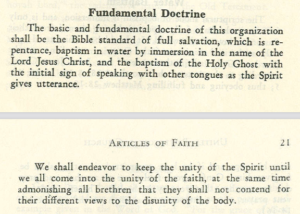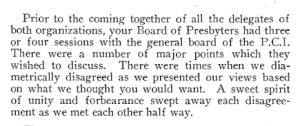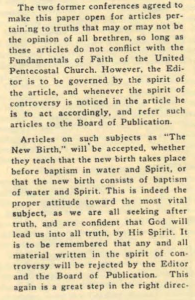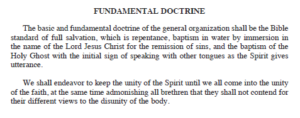The following is part four of a six part guest series from Alicia Sounier Dwivedi, a former United Pentecostal Church member. See Part 1, Part 2 & Part 3.
*********
I will now begin the process of sharing to the best of my ability my journey to REALLY understanding my place in the kingdom of God. However, I don’t want anyone to take my word at face value – study it out. Listen to a variety of teachers on confusing subjects. Take your time, and know God will bless those who seek him. Please also understand, despite what you were taught about having to believe everything a denomination teaches you word for word without any variance or personal opinion, that this is not Biblical and NOT what God designed for his people, the church. I’m not suggesting people need to leave their denominations either. Just be aware when you align yourself with some denominations you oftentimes have to agree to their rules and regulations to be considered “right with God”.
One thing I’ve learned over time is instead of being imagers of Christ we have instead become imagers of denominations.
With some denominations your whole value as a Christian will be based on what you “look” like.
It doesn’t matter what gifts you’ve been given by the Holy Spirit, and it doesn’t matter what important role you have in the body of Christ. You will not be put into any position of ministry because you have not imaged the denomination properly. However, you best still sit in the pew and pay your tithes and give offerings – your money will gladly be used.
Once you have either been guilt-tripped into imaging the denomination again, you will then be considered “spiritual enough” to be in ministry, or you will walk away from the denomination knowing your place is no longer there.
Instead of being shaped into the image of Christ through the development of the Fruit of the Spirit, if we let ourselves we’ll be conformed to religions of this world.
Instead of teaching folks to listen to the voice of God, and allowing the Holy Spirit to convict where needed, the denomination has decided everything for its saints from the top down producing carbon copies of itself.
Seems a lot like idolatry to me…a denomination trying to mold people into its own image.
I was introduced to a Facebook page called SpiritualAbuse.Org when a certain man who’d been a part of my previous church had been charged with multiple cases of molestation was listed there. Originally I thought this page was primarily about molestation by spiritual leaders, but soon realized it was MUCH MORE THAN THIS. This page was FILLED with help for people who had been spiritually abused in any variety of manner. It also included a ton of information on every subject common to the UPC where pros and cons are clearly stated. You can read/listen to various subjects, and then make up your own mind on where you stand. You see, at this point I hadn’t realized spiritual abuse included me somehow.
Now I know the teaching about tongues being necessary for salvation is so hugely erroneous and is a heretical teaching. An alternate salvation was taught to me. Had this false teaching not been pushed on me from the time I was a little child, I don’t know where I would be in Christ right now. The thought of living for the Lord without all of the guilt and shame I carried for all of these years seems nothing short of idyllic. I can barely grasp the concept.
So why do I mention heresy? It’s so much more than just an error in interpretation or an alternate opinion over a trivial matter. “Heresy is sinful because the heretic commits idolatry by making his own beliefs the object of his desire instead of God who is the truth.” The UPC has made an experience determine how they interpret scripture instead of interpreting scripture correctly, and then defining their lives around that interpretation. Don’t believe me? Read I Corinthians 14, and see if church services function like the Bible says they should function. To be fair, I don’t think many churches do.
In no way am I stating in any way, shape or form those who teach tongues for salvation are malicious or somehow have ulterior motives. They’ve been taught this by their peers, and their peers by their peers. The cycle continues. I was once a part of this cycle for 25 years. I wasn’t mean, but I did think I was right. However, I’m thankful that understanding and peace have finally come to me after all of this time, and I pray my testimony reaches many others.
Another thing I’ve come to realize is so many feel like a denomination has saved them with the help of God, instead of recognizing God has saved them through people who have segregated themselves into a denomination. So they become afraid to leave that particular church or denomination. They can’t venture out anywhere else or their salvation will be in jeopardy.
So how did I come to this conclusion that receiving the Holy Spirit didn’t need to be accompanied with speaking in tongues? Well, I can tell you it wasn’t because I wanted to jump to a conclusion to make myself feel better. If it was that easy then I could have just faked speaking in tongues, and deceived myself into thinking what I was doing “was the real thing.”
When I first heard a former Pentecostal preacher/pastor state tongues wasn’t for salvation – I WAS SHOCKED! I thought, “How can he say that?! Could it be true? I need to look more into this.” So began my delving into debates on tongues, and getting my hands on every article I could read about the subject. I thought my head would explode with all of the information I was trying to take in. If tongues were indeed not necessary for salvation, than why had I been taught this? Forty years of anguish were about to be wiped away.
Please know I’m just touching on various scriptures, and not listing a full view of all verses. These are for reference to share an idea, and can be further studied out.
RECEIVING THE SPIRIT DOES NOT EQUAL SPEAKING IN TONGUES
PRAYING IN THE SPIRIT DOES NOT EQUAL SPEAKING IN TONGUES – IT EQUALS MINDSET
* The Spirit came on/in people in the Old Testament, which enabled them to do a variety of things. When the Holy Spirit was present, his power was enough to accomplish tasks through willing men. The Spirit is literally all over the Old Testament, helping mankind do the will of God, and here are just a few examples…
Bezalel is “filled” with the Spirit of God to develop and execute artistic design for the Tabernacle (Exodus 31:2; 35:31).
Sampson performs feats of strength when the Spirit of the Lord comes upon him (Judges 13:25; 14:6, 19; 15:14).
Prophets prophesy when the Spirit of God comes upon them (2 Chronicles 15:1; 20:14; 24:20; Joel 2:28-29; Luke 2:25).
So here we come to the New Testament covenant…
Why would the Holy Spirit not be powerful enough to accomplish various tasks now unless a person is actually speaking in tongues? Has the Spirit somehow become weak or inhibited in the New Testament? Is the Holy Spirit now dependent on man to be speaking an unknown language to be powerful? I THINK NOT.
How do we know the Holy Spirit is present? Well, just like in the Old Testament – we accomplish whatever it is that God wants us to through the power of the Holy Spirit.
*Notice what Paul does in his spirit (lower case ‘s’) is not being done with the Holy Spirit (capital ‘S’) in I Cor 14:13-15. Nowhere in the Bible is Deity referenced with a lower case ‘s’. Paul is speaking about the spirit of man (his spirit) – not God’s Spirit.
*We are told to pray ALWAYS with the Spirit. Eph 6:18 – shall we take this to mean we should only ever pray in tongues or it’s unacceptable? Of course not.
*When Jesus told his disciples how to pray, he did not say they would have an alternate prayer language one day that would make them more powerful prayer warriors. Luke 11:1-13.
*During Paul’s conversion the Bible never says he spoke in tongues. Some would like to ASSUME he did, but this is to promote a doctrinal belief rather than taking the Bible at its word.
*Paul did later say he spoke in tongues more than anybody else. OF COURSE HE DID – HE WAS AN EVANGELIST. He traveled to a variety of countries to bring the Gospel to the Gentiles. How else was he supposed to accomplish this? Hire an interpreter? Oh wait…he had one! The Holy Spirit was with him helping with the Gift of Tongues to overcome the language barrier.
*Tongues given on the day of Pentecost were LANGUAGES that could be interpreted – not something you have to learn to do. Does it ever say anywhere in the Bible you have “baby” tongues or “adult” tongues? No. Does it ever say anywhere in the Bible that some people will not be able to be saved if they cannot speak in tongues? No. Does it ever say in the Bible that it will take some people longer to be saved than others because some have a hard time speaking in tongues? No. Does it ever say some will need to tarry at the altar time and again to be saved because they can’t speak in tongues for the first few hundred times they ask? No.
*Paul states he wishes everyone would speak in tongues, but not everyone did. I’m sure he also wished everyone were sinless, yet no one is. Just because he wished something to be so, doesn’t mean it is so. He rather states that tongues is not the greater gift, but prophecy is. I Cor 14:5.
*Nowhere does Paul ever state there are two types of tongues (first infilling of the Holy Ghost and a Gift of the Spirit). This in itself speaks volumes. Additionally, if we are to believe that there are two types of tongues, then are we supposed to believe there are also two types of all of the Gifts of the Spirit? If not, why not? Why just tongues?
*Paul states IF someone does speak in tongues they should also pray to interpret. I Cor 14:13. I have never heard a preacher get up and tell people prophecy is the greater gift, and if someone speaks in tongues then they should also pray to interpret. It seems to me that tongues is sought after more than any other gift in our day, just like it was in Paul’s day, and he was literally critiquing them for it. However, in our day not only is the Gift of Tongues more coveted, but a whole denomination has been made out of the practice. I think if the Apostle Paul walked into these churches today, he wouldn’t be giving a happy clap on the back and saying “well done.”
*Paul goes on to say if there’s no one to interpret tongues in the church then to keep quiet. He’s not forbidding tongues, but he’s telling them when and how it should be used. Does this sound like anything that happens in our churches? In my experience, no, it does not. It’s believed if you speak in tongues then you are more spiritual, powerful and more in touch with God than those who do not. Not only does the UPC teach you have to speak in tongues on the initial infilling of the Holy Ghost, but you also have to do it repeatedly on cue when asked to “pray in the Spirit” during a church service. Also if you aren’t speaking in tongues pretty much on a daily basis, then you need to question your spirituality – therefore your salvation. THERE’S NO SCRIPTURAL EVIDENCE FOR THIS.
*The Spirit issues the Gifts of the Spirit. I Cor 12:11. It is not a learned language.
*Do all speak in tongues? No. I Cor 12:30
*The Gifts of the Spirit were given to edify the body of Christ. Fruit of the Spirit is individual. The Gift of Tongues was not given so each believer could individually be speaking in tongues in a church service along with everybody else causing confusion.
*Acts 2:38 is misquoted by those raised in the UPC faith.
“Peter replied, ‘Repent and be baptized, every one of you, in the name of Jesus Christ for the forgiveness of your sins. And you will received the gift of the Holy Spirit.’” That’s it, that’s all. There is no “with the evidence of speaking in other tongues” in this verse.
Once again the United Pentecostal Church will try to say, “Well, what Paul meant was.” This is NOT what Paul meant. I think Paul could really say what he really meant to say, and he doesn’t need our help by putting words in his mouth. The UPC has added this in for the sake of trying to make an experience the basis for interpreting scripture. This again is ADDING to the word of God in no small manner, which is heretical.
The UPC has come up with its own doctrinal belief, and has to find ways to support it. If we took the Bible at its word and stopped mish-mashing and cherry-picking verses there would be a lot less hurtful confusion going around. This is no small matter. This is not a simple innocent error in interpretation. This literally changes the Gospel! I stand for the Word of God, and now boldly proclaim the UPC has it completely wrong on this teaching which robbed me of peace in Jesus for a majority of my life. To have a do-over, and be able to live my life resting in the beautiful salvation of Jesus would be a dream come true. However, if that had been my life then I wouldn’t be standing here now publicly shouting from the rooftops that the UPC has gotten it wrong since the late 1800’s – early 1900’s with the Azusa Street Revival.
Pointing out such errors in a belief system is not bitterness, nor is it anger. Do UPC preachers who stand behind their pulpits pointing out where they believe other denominations have gotten it wrong stem from a place of bitterness? I’ve never thought so.
I 100% believe in the Acts 2:38 message – just not the Acts 2:38 quoted by Pentecostals – know the difference! Pentecostals put the burden of obtaining salvation directly onto the individual. However, the Bible clearly states salvation is by BELIEF – not of works, lest any man would boast.
Deanna Jo of Responsible Faith interviews Alicia:
See Part 5.













